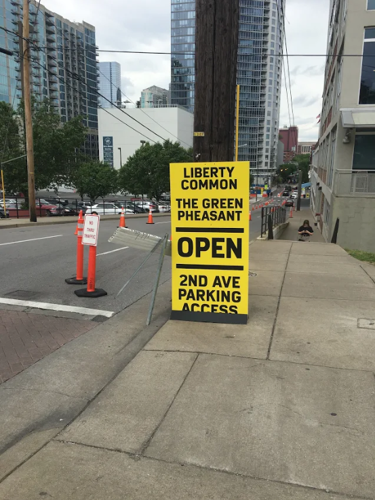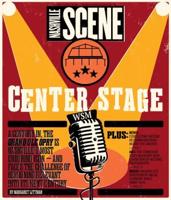
Pictures of a sea of fans on Lower Broad stretching from Second Avenue to Eighth have appeared on screens around the globe this week. But a few businesses on First Avenue are concerned over some unexpected setup logistics and unintended consequences that are causing their business to slow down — not speed up — during this long NFL Draft party weekend.
Patricia Raley’s husband Terry owns Liberty Common, the new patio-centric, French-inspired restaurant just south of Broadway on First Avenue. She says that given their proximity to the action, their team prepped for larger-than-average pedestrian crowds this week, scheduling more staff and ordering more ingredients. But a combination of factors has led to business being slower than usual, despite the nearby crowds — a security checkpoint that partially blocks the view of the restaurant’s entrance and patio (although not the actual egress); confusion about where security teams ought to direct pedestrians; and early closures by neighboring businesses.
Within hours of learning of the problematic security checkpoint, the Nashville Convention and Visitors Corp. helped remove some of its vinyl signage to increase visibility of the patio. The NCVC also printed and hung bright-yellow signage indicating that both Liberty Common and its neighbor The Green Pheasant are open, and issued posts on social media, encouraging hungry fans to patronize the eateries.
“When we received word of the issue [Wednesday] night, we immediately posted support on social media,” says Butch Spyridon, president and CEO of the NCVC. “[Thursday] we removed the blockage, posted on socials again, added signage and offered some financial remuneration. Our intent is always for our local businesses to benefit from major events.”
Raley is appreciative of that help, but says she would like to see the checkpoint moved closer to Broadway to provide clearer access to the patio. She also says the $10,000 offered is not enough to make up for the added expenses the new restaurant has incurred.
As a member of the team behind the late Holland House Bar & Refuge and the popular Pharmacy Burger and Butchertown Hall, Raley is used to being an early adopter, opening restaurants on streets where there isn’t a ton of pre-existing foot traffic.
“This is not a gripe that we are not reaping the spoils from the draft,” she says. Rather, she notes that Liberty Common is a new restaurant still getting established. “It is really important in the first quarter of opening a restaurant to make your marks," she says. "It has been difficult with First Avenue compromised.”
Raley says that if she and her team had known they wouldn’t get to take advantage of their patio overlooking the Cumberland River and Ascend Amphitheater, they might have decided close rather than staffing up — or perhaps they would have marketed differently.

Liberty Common
First Avenue business owners knew that the street would be closed to vehicular traffic, but say they expected they’d have some advantages when it came to foot traffic. Chef Jess Benefield is one of the owners of The Green Pheasant, which is just south of Liberty Common. She says she expected that being in between the Uber/Lyft drop-off site at Korean Veterans Boulevard and Broadway would put her restaurant in a prime location. But because First Avenue is being used primarily to usher VIPs from Ascend to the stage on Broadway, that hasn’t happened.
“We thought we would have all these people walking around,” says Benefield, who opened The Green Pheasant in November, to much acclaim. “It's beyond frustrating. The NFL wanted Broadway, and they prioritized those businesses over all others, treating First as a service alley.”
Both restaurateurs know that because of their relatively high-end menus, they’re not exactly the typical destination for the majority of beer-drinking NFL fans during the draft. But they did think they'd be a draw for folks looking for a honky-tonk alternative. Benefield says all of her business on Thursday came from advance reservations (no walk-ups), and that two large (20-people each) parties canceled their reservations due to concerns about getting to the restaurant.
Following Mayor Briley’s call to encourage downtown employees to work from home during the draft, several of the businesses upstairs in the building officially known as 222 Second Avenue closed for the event. While Benefield and Raley understand this decision, they say it has caused both lunch and happy-hour business to plummet.
“Our landlord is amazing,” Benefield says. “He went above and beyond attending all the meetings, and we thought we understood what the closures would mean. But we were devastatingly caught off-guard.”
Both restaurants have used social media to try to drive traffic this week.
Restaurateur Patrick Burke, one of Benefield’s partners in The Green Pheasant, is a supporter of the NCVC’s “multi-decade strategy to grow Nashville.” He says he's primarily looking forward at this point and plans to have conversations with the Mayor’s Office and the NCVC about how to incorporate local businesses in future big events — such as the World Cup in 2026, which Nashville is seeking to host.
Burke considers himself a longtime supporter of downtown businesses — he and his wife went to Robert's Western World the night they met. But he's concerned that if international television coverage, whether of the NFL Draft or New Year's Eve, shows only Broadway crowds, that doesn't accurately "showcase the diversity of passions and people" in the city. He says making sure that businesses off Broadway, including restaurants, are part of future plans will help continue to draw people to Nashville.






